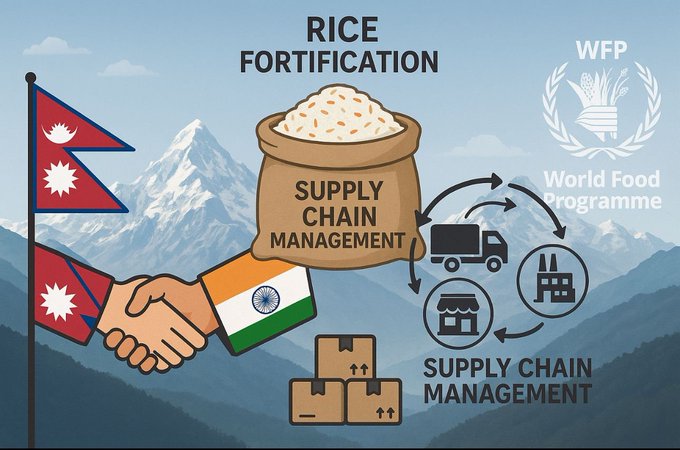
New Delhi/Kathmandu – In a significant move to enhance regional food security and public health, India has launched a collaborative initiative with the United Nations World Food Programme (UN WFP) to strengthen rice fortification and supply chain management in Nepal. The initiative is part of the India-UN Global Capacity Building Initiative, inaugurated on August 1, 2025, by the Ministry of External Affairs, Government of India.
Addressing Key Gaps in Nepal’s Food Supply Chain
The project is designed to bridge critical gaps in Nepal’s fortified rice supply chain, particularly in areas like procurement, data management, and skilled manpower. Drawing on India’s robust Public Distribution System (PDS), the initiative aims to facilitate the transfer of best practices and digital innovations to enhance Nepal’s capacity for effective food distribution.
Key areas of focus include:
Beneficiary identification and management
Storage and distribution models
Monitoring and evaluation systems
Grievance redressal mechanisms
Three-Phase Implementation Over 12 Months
The programme will roll out in three phases over 12 months:
1. Phase 1 – Needs assessment and engagement with key stakeholders
2. Phase 2 – Study tour to India for Nepali officials, including practical demonstrations and expert consultations
3. Phase 3 – Development of a detailed action plan based on shared learnings
Supported by India’s ITEC Programme
The training component will be carried out under the Indian Technical and Economic Cooperation (ITEC) programme, a flagship capacity-building initiative of the Government of India. Since 2001, more than 3,000 Nepali officials have received training under this programme.
Backdrop and Broader Initiative
The India-UN Global Capacity Building Initiative was first announced in September 2023, during the 78th United Nations General Assembly. Following the announcement, the Indian Ministry of External Affairs and the UN Country Team in India worked together to identify projects aimed at accelerating progress toward the Sustainable Development Goals (SDGs) through South-South cooperation. This Nepal-focused rice fortification project is one of four flagship projects selected under the initiative.
Public Health and Trade Implications
In the last fiscal year, Nepal imported over 800,000 metric tons of rice from India, including 500,000 metric tons of Basmati rice alone. Through this new partnership, fortified rice enriched with micronutrients such as iron, folic acid, and vitamin B12 will be introduced to address nutritional deficiencies and improve health outcomes for vulnerable populations across Nepal.
